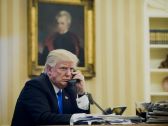Trump Planned on Moving Embassy to Jerusalem 'At 12:01 on Inauguration Day'
Two days before Netanyahu meets Trump at the White House, Senator Bob Corker tells Politico that moving the embassy from Tel Aviv to Jerusalem was going to be the administration's 'first move.'

Forty-eight hours before Prime Minister Benjamin Netanyahu arrives at the White House for his first meeting with President Donald Trump, a senior Republican senator explained in an interview published on Monday how the Trump administration originally planned to move the U.S. Embassy in Israel to Jerusalem on the president's very first day in office – but then took a step back, mainly due to the possible regional implications of such a move.
>> Get all updates on Israel, Trump and the Palestinians: Download our free App, and Subscribe >>
Senator Bob Corker (R-TN,) the chairman of the Senate Foreign Relations Committee, said in an interview to Politico's Global Podcast that Trump at one point was "ready to move the embassy at 12:01 on January 20th. Maybe even 12 and thirty seconds." Corker added that announcing the relocation of the embassy "was going to be their first move," but that ever since entering the White House, Trump's team has been going through an evolution and "they get a greater sense of some of the complexities that exist."
The senior senator's words seem to echo what Trump's press secretary, Sean Spicer, said on January 19th, a day before Trump was sworn in as president, at a press briefing. When asked about the embassy move, Spicer said that an announcement about it would be made "soon," and encouraged the journalists to "stay tuned" on the subject. At the same time, some news outlets in Israel quoted Israeli sources claiming that Trump would announce the embassy move within days. So far, however, almost a month has passed since Trump took office, and no announcement has been made.
Corker explained in the interview what might have caused the administration to put its original plan on hold. "At one point they were ready to move the embassy at 12:01 on January 20th, maybe 12 and 30 seconds. That was going to be their first move. I think that my question at the time was – how does Israel feel about this? They've never had a closer relationship with the Arab world." Corker added that as a result of the nuclear deal with Iran, which both Israel and the Sunni Arab states opposed, "there's a real working relationship there right now, so when you got a situation like that, do you want to destroy this alliance that's unprecedented?"
Corker said that the embassy move could still happen, but that it would have to be done only after consultations with the important Arab states in the region. "I think they got to communicate to the Arab world that this isn't doing away with the two-state-solution. There's a lot of communication that's got to come with it." He also said the administration could be waiting with the move until after Trump's choice for ambassador to Israel, David Friedman, is confirmed by the Senate. Friedman's first confirmation hearing before the committee chaired by Corker will take place on Thursday.
"My sense is they're still moving there, but they're doing some of the things that need to happen," Corker explained. He mentioned in that regard the influence that Jordanian King Abdullah had on the administration, after his visit to Washington last week and his meeting with the president. "The King was here last week. I call him the Henry Kissinger of that part of the world, and we do always love to listen to his view of the region. He's got a lot of investment with his own citizens in the two-state-solution, so anything that flies in the face of that could be seen as a diss to him. So he's very sensitive about it."
Follow @amirtibon
The Trump administration, Corker said, was beginning to see the problematic aspects of moving the embassy even before the meeting with the king, which only reinforced it. "I think they were already moving in that direction. An evolution is occurring – they get a greater sense of some of the complexities that exist." Trump himself said in a number of recent interviews that it was "too early" to discuss the embassy move, after promising clearly during the election that he will move it quickly once he takes office. The issue could likely be discussed in the upcoming meeting between Trump and Netanyahu on Wednesday.
Want to enjoy 'Zen' reading - with no ads and just the article? Subscribe today
Subscribe now



















